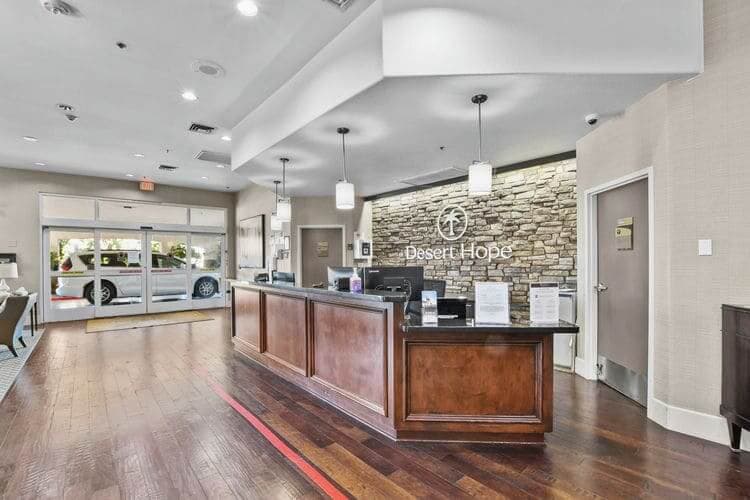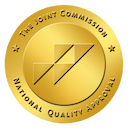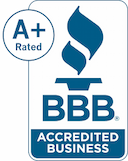Alcohol & Drug Rehab Near Phoenix, Arizona
If you’re looking for drug rehab near Phoenix, Arizona, you may want to consider Desert Hope Treatment Center. Located in Las Vegas, Nevada, Desert Hope provides life-saving, evidence-based addiction care.
Understanding what services Desert Hope offers, how these services can help treat addiction, and how to verify your insurance can be important first steps for achieving recovery.

Drug & Alcohol Rehab Near Phoenix, Arizona
Addiction treatment isn’t one-size-fits-all. Finding a program that works for you is critical to your success. If you are looking for drug or alcohol rehab, you can learn more about addiction treatment near Arizona using our Arizona rehab guide.
Being a large city, Phoenix has many local rehab options, but not all may suit a patient’s needs. Some people might choose to attend treatment out of state to change their regular environment or because out-of-state facilities offer unique specialty programs that appeal to them. Whatever the reason, it’s important to understand the different types of treatment available.
Addiction Treatment at Our Rehab in Las Vegas
Arizona residents seeking out-of-state treatment may find Desert Hope’s treatment services an excellent fit. Desert Hope’s staff offers many levels of care to help patients craft an individualized treatment track. Some of Desert Hope Treatment Center’s services include:
- Detox. Medical detoxification services, or detox for short, is the process by which the body rids itself of harmful substances. Due to the potential appearance of uncomfortable withdrawal symptoms, many may choose to undergo this process with medical supervision.
- Inpatient/Residential treatment. Inpatient (or residential) treatment allows the patient to live at the rehab facility while receiving 24/7 care.
- Outpatient treatment. Outpatient treatment allows the patient to live and work at home while still receiving care. There are three main types of outpatient treatment: standard outpatient, intensive outpatient, and partial hospitalization programs.
Additionally, there are various therapies offered by Desert Hope, such as:
- Cognitive behavioral therapy (CBT).
- Dialectical behavior therapy (DBT).
- Motivational interviewing (MI).
- Eye Movement Desensitization and Reprocessing (EMDR).
- Family therapy.
- Psychoeducation.

Why Choose Desert Hope Treatment Center?
Desert Hope is a drug rehab in Las Vegas that offers patients a variety of amenities, accommodations, and specialized programs in addition to evidence-based treatment.
Amenities and Offerings at Desert Hope
Desert Hope Treatment Center offers a variety of amenities and accommodations, such as:
- 12-step meditative walk.
- Art therapy room.
- Gourmet meals.
- Indoor fitness center.
- Outdoor fitness area.
- Library.
- Music room.
- Onsite laundry facilities.
- Outdoor patios.
Take a Look Inside Our Nevada Rehab Center
Specialized Addiction Treatment Programs Offered
Specialized treatment programs are treatment tracks tailored to a specific population or demographic. Some of the specialized programs Desert Hope offers include the following:
- Veterans programs: Oftentimes, Veterans will face unique challenges when struggling with addiction. Veterans programs are designed to address these challenges and help this group find recovery.
- First responders programs: First responders, like firefighters, EMTs, or police officers, may develop addiction while working in their high-stress fields. These programs are tailored to help this group process stress and achieve recovery.
How to Get to Desert Hope Treatment Center From Phoenix, Arizona
There are two main ways to get from Glendale to Las Vegas: by plane and by car. Flying can be expensive, but can quickly take you from the Phoenix airport to the Las Vegas airport. From there, you can take a cab from the airport to Desert Hope at 2465 East Twain Avenue.
Another method would be to drive, which is significantly longer in terms of travel time (between 4 and 5 hours) but also significantly cheaper. From Phoenix, navigate to Interstate 93 North and take this road until you reach Boulder City, Nevada. From there, take the 11 directly into Las Vegas.

How to Pay for Addiction Treatment Near Phoenix, Arizona
Insurance and self-pay are the two main ways to pay for treatment near Phoenix, Arizona.
Paying for addiction treatment near Phoenix, Arizona, can be difficult, but shouldn’t be a barrier to potentially life-saving care. One of the most common ways to pay for treatment is to use insurance. Private insurance is usually provided by an employer or purchased on the healthcare marketplace.
Public insurance includes plans like Medicare and VA insurance and is usually given by the government to individuals who meet certain requirements. Regardless of which insurance you have, it’s important to reach out to treatment facilities and your insurance representatives to determine costs.
Additionally, self-pay may be a way to cover out-of-pocket costs associated with treatment. Some facilities offer sliding-scale fees or payment plans to lessen the upfront cost of treatment.
Does Insurance Cover the Cost of Drug Rehab Near Phoenix?
The Affordable Care Act (ACA) requires all health insurance plans to provide some degree of coverage for the medically necessary treatment of mental health disorders. This means that your insurance plan may cover some or all of the cost of addiction treatment in Nevada.
However, coverage can vary depending on location, plan, and the type of services sought. Whether you have Aetna, Cigna, Ambetter, or some other insurance provider, you can quickly check your insurance coverage for rehab by completing the secure online form below:
Get Admitted to Addiction Treatment Near Phoenix, Arizona
If you or a loved one is looking for addiction treatment in or around Phoenix, it’s important to remember that you are not alone. Help is available at Desert Hope Treatment Center.
Our compassionate admissions navigators are available 24/7 at . These professionals can answer questions about addiction and help verify your insurance benefits. Don’t delay. Call us today to get started, or visit our admissions page.




